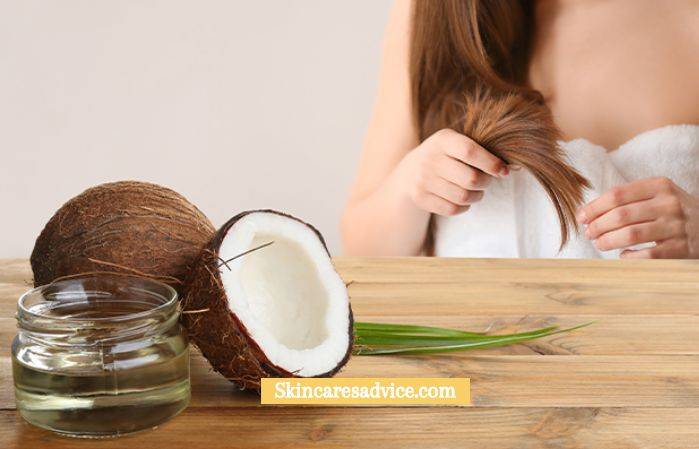Have you ever wondered why coconut oil is an ingredient in almost all skincare and beauty products? Is coconut oil beneficial for hair? For years, people have used coconut oil as a natural sunscreen and moisturizer. Its natural moisturizing qualities can be enhanced by adding this ingredient to your regular hair oils, coconut shampoos, conditioners, and even body lotions or creams. Coconut oil has become an essential part of many women’s beauty, skin, and hair care routines worldwide because of its many beneficial applications. Let’s learn more about the wonders that coconut oil can do for hair and the advantages of using coconut oil for hair.
What Exactly Is Coconut Oil?
Fatty oil called coconut oil is extracted from the meat and milk of coconuts. It must go through several processing steps to transform the flesh and milk of the coconut into the final product because it is not naturally found therein. Depending on the kind, quality, and intended usage of the oil, these processing steps change.
Although coconut oil is referred to as oil, it is often a solid at room temperature. Normally, it has a whitish, waxy, and moist appearance. You won’t even be aware of its presence if it’s an ingredient in another product.
Advantages Of Using Best Coconut Oil For Hair
1. Helps in conditioning and softening the hair: For all hair types, using coconut oil to the hair helps minimize protein loss. Additionally, this oil is also excellent as a daily conditioner because it has a high lauric acid content and readily permeates the hair shaft.
2. Helps In Adding Shine to Hair: Using coconut oil on your hair not only helps to seal in moisture but also imparts a stunning radiance and shine to your hair locks.
3. Enhances The Hair Growth: Using coconut oil is a natural technique to promote faster, thicker, and longer-growing hair. The natural vitamins and vital fatty acids in coconut oil feed the scalp and aid in clearing the hair follicles of accumulated sebum.
4. Fixes Split Ends: Split ends can be rapidly repaired with coconut oil, which is one of its most well-known advantages. Preventing split ends in hair can also be achieved by applying heated coconut oil.
5. Protects From Sun Damage: Both the texture and quality of your hair can be harmed by UV radiation. Applying coconut oil to your hair is a great way to shield it from sun damage, according to studies.
6. Fights Against Dandruff: In addition to moisturizing and mending damage to hair, coconut oil can aid in the battle against dandruff. Research says that coconut oil is a great source of antioxidants and anti-inflammatory properties that can shield the scalp from harm. Its all-beneficial microorganisms also aid in dermatitis prevention.
Which Coconut Oil Kind Is Ideal For USE
First, let’s discuss which type of coconut oil is ideal for hair. Generally speaking, extra virgin coconut oil (EVOO) is preferable because refined or processed coconut oil frequently contains bleach. To extend its self-life, the oil could also be chemically processed. Make sure you’re utilising pure coconut oil, or the purest version available to you, in your personal care products. Extra virgin coconut oil doesn’t go through any of these processes!
How To Apply Coconut Oil To Hair
We’ll go over the two main use of coconut oil for hair that feels and looks amazing: as a hair oil and as a mask. Keep in mind that if you have dandruff, a hair mask definitely isn’t the ideal choice for you. Because they are so intense, they are applied to strands for a longer period of time than, say, a short spot treatment of damaged ends with coconut oil.
Just be careful to apply a thin layer of coconut oil to your scalp and follow up with a hydrating conditioner if you have dandruff and truly want to try a hair mask.
To make sure there are no allergic reactions or skin irritations, test coconut oil on a small area of skin before using it on your scalp, regardless of the condition of your hair.
Coconut Oil As a Hair Mask:
Apply coconut oil to your hair before washing it, and be sure to cleanse, condition, and completely rinse off the oil afterward.
- Step 1: If the coconut oil isn’t already liquid, start by heating one to two teaspoons of it. You can microwave it in a small bowl or use a small pot on the stove to melt it. Just heated enough to prevent lumps and ensure a smooth consistency will do. It doesn’t have to be hot. Just enough of the heated oil will be sufficient to ensure an even coating, so don’t use the entire amount.
- Step 2: Put in an application! Using a wide-toothed comb and your fingers, comb through your dry hair to distribute the coconut oil. You should start at your hair’s roots and work your way all the way to the ends. You don’t need to go overboard because coconut oil is so powerful (and greasy). There are no advantages to more oil. All you need is a thin, even layer that applies consistently!
- Step 3: You can leave the coconut oil mask on for as long as thirty minutes. Then, for silky and nourished hair, you only rinse, shampoo, condition, and rinse again, as previously suggested! You can skip the waiting period and get right to the rinsing if you’re in a rush. However, we advise leaving it in for the whole thirty minutes for the best effects.
How To Apply Hair Oil Made Of Coconut Oil
As long as you know a few tips, applying coconut oil to your hair is really easy. Here are three steps to use it as a hair oil for shiny, frizz-free hair.
- Step 1: If the coconut oil isn’t already liquid, heat one to two tablespoons, just like you would with the hair mask above. Once more, you can melt it over the stove or in the microwave. Just enough heat should be applied to the oil to achieve a smooth consistency. Just enough oil should be used to create a thin, even coating; you may not need to use all of the oil you prepared.
- Step 2: Now apply the coconut oil. You should use this after washing your hair while it’s still damp, not dripping, unlike the coconut oil hair mask. Apply a tiny quantity of oil to the bottom third of your hair and work it all the way to the ends of your hair with your fingers or a comb. (This is a fantastic method for tying up any loose ends!) You can also concentrate on any frizz- or tangle-prone sections of your hair.
- Step 3: After applying the coconut oil evenly, blow dry your hair and style it as usual. While it will remove some of the oil, towel drying is also a temporary fix. Because your hair may appear a little greasy right away after applying coconut oil, we advise applying it later in the day.
Conclusion:
Although coconut oil has certain advantages, it shouldn’t be used in place of your usual hair care regimen. Use your usual shampoo and conditioner as before.
By following above mentioned rules and tips, you can get the most out of your coconut oil hair treatment and benefit from its advantages for your hair and scalp.
FAQs:
Q. Can Coconut Oil Help In Stopping Hair Fall?
As coconut oil absorbs thoroughly, it may help to slow down hair loss.
Q. Does Coconut Oil Help In Hair Thickening?
Coconut oil strengthens and fortifies hair, giving the appearance of thicker, fuller hair by penetrating it and reducing protein loss. Repairs damage: The antioxidant qualities of coconut oil assist to strengthen and restore damaged hair.
Q. Should I Do Hair Oiling Every Day?
It’s sufficient to oil your hair 1-2 times per week. Regular use can draw dirt into your hair and deplete it of important oils. Breakage can also result from combing, rubbing, and aggressively massaging oil into your hair.



